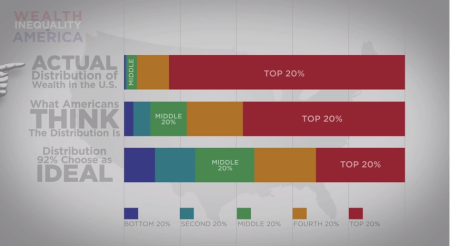What Does The Bible Say About Income Inequality?

Christian scholars agree that the unequal distribution of income is not inherently unChristian or unjust, so long as the poor can produce enough wealth to sustain themselves.
"I think that a good, short statement of a biblical definition of economic justice is that God wants every person and every family to have access to the productive resources, so that if they act responsibly they can earn their own way and be productive members of society," Ron Sider, distinguished professor of Theology, Holistic Ministry & Public Policy at Palmer Theological Seminary, told The Christian Post on Wednesday. "I am not arguing for equality of income and wealth," Sider stated, bluntly.
Jordan Ballor, research fellow at the Acton Institute and executive editor of the Journal of Markets & Morality, agreed with Sider that income inequality is not inherently unbiblical. "The challenge is distinguishing natural inequalities, which arise out of the variety of human gifts and talents, from unrighteous and unjust inequality," Ballor explained.
"We are going to make different amounts, but it doesn't mean that we are unequal in God's eyes," Anne Bradley, vice president of Economic Initiatives at the Institute for Faith, Work, and Economics (IFWE), told CP on Wednesday. She argued that the fundamental measure of how the poor fare in society isn't the distribution of income, but income mobility — a person's ability to find a higher paying job.
Bradley pointed to Jesus' "Parable of the Talents" in Matthew 25 to illustrate what the Bible says about income inequality. Each of the workers was given money to steward, "according to their abilities," Bradley explained. The two who invested wisely earned 100 percent of what they were given. The message? "God will reward you fully for what you invest."
Sider pointed to a number of factors that produce inequality. "Creativity and hard work create wealth, while irresponsible decisions tend to reduce wealth," the theologian explained. Income inequality is not inherently wrong.
When Income Inequality Becomes Unjust
Nevertheless, each of the scholars argued that America's economic system has fundamental flaws that make income inequality worse than it should be.
"We have in this society now, economic and political power enormously centralized — both parties are essentially controlled by the richest one percent," Sider argued. Interest groups, political action committees, and congressional donations give the rich powerful sway over politics. In light of this, the proposal that "we ought to give more huge tax cuts to the richest Americans and at the same time cut food stamps and foreign aid" is "a fundamentally unbiblical, unjust, immoral position."
Sider advocated for tax increases on the richest Americans, tax benefits for the poor, and a more efficient educational system. "In an information society, knowledge is the capital, so genuinely providing a quality education to everybody in our society would be the single most important way to provide access to the productive resources so people can earn their own way," he explained.
Ballor agreed that the centralization of power hurts the poor, but advocated a very different solution. "You don't see envy talked about very much in this discussion — you hear greed," the Acton scholar explained. "The Bible warns about greed, but it also warns about envy — when you grieve at something someone else has been blessed with."
Envy can have two results, Ballor argued. It can drive someone to take the good away from the person they envy, making everyone worse off, or it can drive them to work harder to become more productive and achieve the same thing as the person they envy. Envy drives the idea that wealth is a fixed pie, where if the rich get more, it is because they stole it from the poor. But that is not how the economy works, Ballor said.
"We need to get out of that envying, fixed-pie mindset and get into a serving, other-directed mindset that improves the quality of life for everyone," the Acton scholar argued. In a free market economy, he explained, people become rich by serving others, by producing something they would willingly buy. Jesus' commandment that we love one another will make us more productive, and therefore richer.
Bradley agreed with Ballor, but added that the economy is twisted against the poor. "A cronyist society means firms can go to the government for protection, for special favors that other people don't get — that's why we see so much lobbying in the Federal Government," she argued. When rich, established companies convince the government to add new regulations, it prevents smaller firms from competing for business.
"We're creating an environment where the rich aren't getting rich because they serve people but because they're rigging the game," Bradley argued. By lobbying Congress, companies cheat in business, earning money without needing to serve others. "It's unjust because we are rigging the system so we can benefit at the expense of someone else — that is unbiblical," the IFWE scholar argued.
To learn more about income inequality, check out these videos:





















